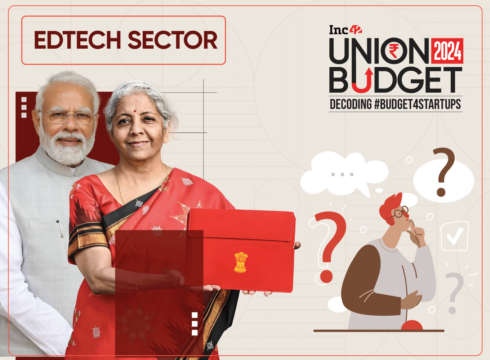IEC co-chair and Physics Wallah cofounder Prateek Maheshwari said reducing GST for the edtech sector in the Budget will address challenges such as affordability and accessibility
A strategic GST policy, accompanied by incentives, would empower edtech companies to create innovative tools, said Assiduus Global’s Somdutta Singh
Indian edtech startups are also seeking regulatory support and tax breaks in the upcoming interim Budget 2024 to instil confidence in the ecosystem
Inc42 Daily Brief
Stay Ahead With Daily News & Analysis on India’s Tech & Startup Economy
The Indian edtech startup ecosystem has seen nothing short of a meltdown in the past two years. From being the darling of VCs in 2021 to struggling for funds in the subsequent years, the homegrown edtech landscape has seen it all.
This shift in investor sentiment is especially evident in the funding raised by the startups in the space. Capital inflow into the edtech sector tanked to a mere $283 Mn in 2023 from $2.4 Bn in 2022 and $4.7 Bn in 2021.
Besides, issues such as no clear path to profitability and heavy cash burn continue to plague the ecosystem.
Amid all these, as the countdown to the Union Budget 2024 has begun, the edtech ecosystem has pinned its hopes on finance minister Nirmala Sitharaman to get it back on track.
With general elections slated later this year, FM Sitharaman will present an interim Budget on February 1. She has already clarified that there will be no major announcements and the financial document will largely focus on government expenditure.
Despite this, Indian edtech startups are hopeful of incentives and rebates from the Centre that could reverse the fortunes of the sector. Their biggest demand from this year’s Budget is reduction of GST on edtech offerings.
Edtechs Pitch For Lower GST Rates
Under the current rules, services offered by edtech players attract 18% GST and allied hardware products are charged a 28% rate.
“In view of the upcoming interim Union Budget, we would like to appeal to the government to reduce the GST slab from 18% to 5% on educational products & services…. Reducing GST on educational services would also remove financial strain on parents and promote affordability…,” said co-chair of India Edtech Consortium (IEC) and Physics Wallah cofounder Prateek Maheshwari.
The IEC counts the likes of BYJU’S, Unacademy, upGrad, Vedantu and Classplus as its members.
The same sentiment was echoed by others. Anita Rehman, partner at Celesta Capital, said reducing the GST rate for the edtech sector to below the 18% threshold can address challenges such as affordability and accessibility.
Meanwhile, edtech unicorn LEAD Group’s cofounder and chief executive officer (CEO) Sumeet Mehta said that GST relief on school-centred solutions can foster innovation in the sector and pave way for improved access to affordable and high-quality education.
Battered Edtechs Gun For Tax Breaks
Beyond the reduction in GST rates, Indian edtech startups want the Centre to announce a strategic GST policy and other incentives in this year’s Budget to provide a boost to the sector.
“A strategic GST policy, accompanied by incentives, would empower edtech companies to create innovative tools. The sector is also anticipating Budget allocations for cutting-edge technologies, improved accessibility, and a favourable regulatory environment,” said Somdutta Singh, an investor and founder of startup accelerator Assiduus Global.
Alongside, stakeholders are hopeful of tax breaks and grants in the short term to instil confidence in the ecosystem.
“In the short run, we are looking forward to regulatory support, tax breaks and grants to instil confidence in the ecosystem. In the long run, user-centric schemes hold utmost importance so that more potential students come to edtech platforms to pursue their studies,” said edtech startup Vidyakul’s cofounder and CEO Tarun Saini.
He added that the impact of such sops will largely depend on effective on-ground implementation and how edtechs align themselves with changes resulting from such incentives.
Investment firm 35 North Ventures’ founder and managing director Milan Sharma also urged the government to offer special tax exemptions for startups in areas where literacy rate is very low by forming ‘Special Education Zones’.
Industry stakeholders believe that the education sector will get higher budgetary allocation this year to achieve the National Education Policy 2020’s target of increasing public investment into the sector to 6% of the GDP. Such a move is expected to facilitate experiential learning, digitisation, and infrastructure enhancement, thereby funnelling more capital into the edtech sector.
For Saini, government policies such as Sarv Shiksha Abhiyan and Rashtriya Madhyamik Shiksha Abhiyan have also directly and indirectly benefited many edtech startups and he anticipates more such policies from the government.
Promoting Innovation & Integrating New Technologies
Amid the ongoing turmoil in the sector, Indian edtech startups are also seeking favourable policies in the upcoming interim Budget to create an enabling environment for innovation and research and development (R&D).
Adda247’s cofounder and CEO Anil Nagar said that the government policies should ideally create a supportive ecosystem for growth, rather than just doling out financial incentives. Hence, the upcoming Budget should focus more on capacity building and technology across the entire education spectrum, he added.
Many industry players believe that earmarking higher resources for the sector will eventually trickle down to incubators and R&D centres, which can foster further growth and push budding players in the market.
As such, the expectation is higher budgetary allocation for government accelerator programmes that can help young startups take off will increase. Besides, most of the stakeholders Inc42 spoke with also sought more collaboration between edtech startups and the government so that the former can expand their services to the country’s hinterlands and onboard more learners on the edtech bandwagon.
“The Budget should introduce measures promoting innovation, skill enhancement, and quality learning. The pandemic highlighted edtech’s crucial role and, with continued proactive government support, edtech startups can contribute to the nation’s educational growth and competitiveness,” Assiduus Global’s Singh said.
Note: We at Inc42 take our ethics very seriously. More information about it can be found here.


